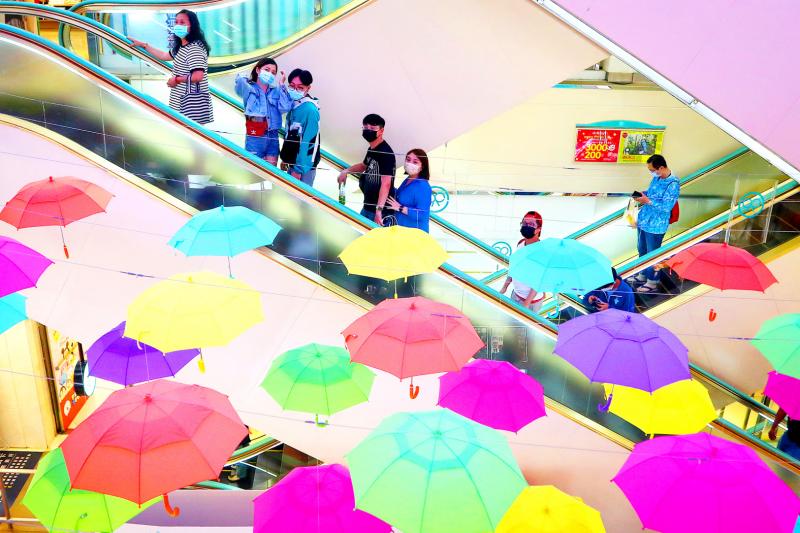Taiwan’s GDP growth was 8.16 percent last quarter, beating the government’s February forecast by 1.96 percentage points, as demand for all product categories grew, thanks to stronger exports and private investment, the Directorate-General of Budget, Accounting and Statistics said yesterday.
The figure is the best in more than a decade and could hoist full-year growth to 5.1 percent, from 4.64 percent, in the absence of corrections for the rest of the year, national income section official Wu Pei-shuan (吳佩璇) told a news conference in Taipei.
“Exports and private investment turned out way stronger than we expected two months earlier,” Wu said.

Photo: CNA
Exports soared 24.58 percent during the January-to-March period, faster than a 16.77 percent increase the statistics agency projected, as local firms benefited from an improving global economy, Wu said.
Shipments of electronics spiked 28.37 percent, while information and communications technology devices rose 29.6 percent, the official said.
Taiwan is home to the world’s largest contract suppliers of chips, camera lenses, flat panels, battery packs and other devices used in smartphones, TVs and laptops, as well as artificial intelligence and Internet of Things applications.
Business in traditional sectors also increased with advances of more than 20 percent in exports of machinery, plastics, chemicals and base metal products, which are signs that the recovery is broad-based rather than limited to tech firms as it was last year, Wu said.
External demand contributed 4.53 percentage points to first-quarter GDP, suggesting that other components also made contributions, the agency said.
Capital formation by the public and private sectors expanded 8.29 percent, as imports of capital equipment rose 18.33 percent year-on-year, Wu said.
Wu said that the statistics agency had forecast a slowdown in purchases of capital equipment from record-high numbers a year earlier, but the reality proved different.
Private investment is strong amid local chipmakers, memorychip makers, and chip testing and packaging service providers, Wu said, adding that petrochemical and other non-tech companies also bolstered investment to meet growing business needs.
Private consumption gained 2.08 percent, reversing four quarters of decline, as retail sales grew 9.08 percent, while restaurant revenues picked up 7.38 percent, although border controls continued to weigh on foreign tourist arrivals, the agency said.
The local bourse — with daily turnover more than doubling from a year earlier — also lent support, it said.
Government spending also increased 4.32 percent, adding 0.58 percentage points to the economy, it added.
In all, domestic demand rose 4.09 percent and lifted GDP growth by 3.63 percentage points, it said.
The statistics agency is to update its growth projections on May 28.

CHAOS: Iranians took to the streets playing celebratory music after reports of Khamenei’s death on Saturday, while mourners also gathered in Tehran yesterday Iranian Supreme Leader Ayatollah Ali Khamenei was killed in a major attack on Iran launched by Israel and the US, throwing the future of the Islamic republic into doubt and raising the risk of regional instability. Iranian state television and the state-run IRNA news agency announced the 86-year-old’s death early yesterday. US President Donald Trump said it gave Iranians their “greatest chance” to “take back” their country. The announcements came after a joint US and Israeli aerial bombardment that targeted Iranian military and governmental sites. Trump said the “heavy and pinpoint bombing” would continue through the week or as long

TRUST: The KMT said it respected the US’ timing and considerations, and hoped it would continue to honor its commitments to helping Taiwan bolster its defenses and deterrence US President Donald Trump is delaying a multibillion-dollar arms sale to Taiwan to ensure his visit to Beijing is successful, a New York Times report said. The weapons sales package has stalled in the US Department of State, the report said, citing US officials it did not identify. The White House has told agencies not to push forward ahead of Trump’s meeting with Chinese President Xi Jinping (習近平), it said. The two last month held a phone call to discuss trade and geopolitical flashpoints ahead of the summit. Xi raised the Taiwan issue and urged the US to handle arms sales to

BIG SPENDERS: Foreign investors bought the most Taiwan equities since 2005, signaling confidence that an AI boom would continue to benefit chipmakers Taiwan Semiconductor Manufacturing Co’s (TSMC, 台積電) market capitalization swelled to US$2 trillion for the first time following a 4.25 percent rally in its American depositary receipts (ADR) overnight, putting the world’s biggest contract chipmaker sixth on the list of the world’s biggest companies by market capitalization, just behind Amazon.com Inc. The site CompaniesMarketcap.com ranked TSMC ahead of Saudi Aramco and Meta Platforms Inc. The Taiwanese company’s ADRs on Tuesday surged to US$385.75 on the New York Stock Exchange, as strong demand for artificial intelligence (AI) applications led to chip supply constraints and boost revenue growth to record-breaking levels. Each TSMC ADR represents

Pro-democracy media tycoon Jimmy Lai’s (黎智英) fraud conviction and prison sentence were yesterday overturned by a Hong Kong court, in a surprise legal decision that comes soon after Lai was jailed for 20 years on a separate national security charge. Judges Jeremy Poon (潘兆初), Anthea Pang (彭寶琴) and Derek Pang (彭偉昌) said in the judgement that they allowed the appeal from Lai, and another defendant in the case, to proceed, as a lower court judge had “erred.” “The Court of Appeal gave them leave to appeal against their conviction, allowed their appeals, quashed the convictions and set aside the sentences,” the judges